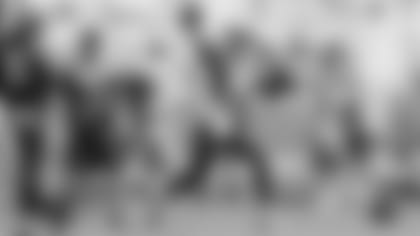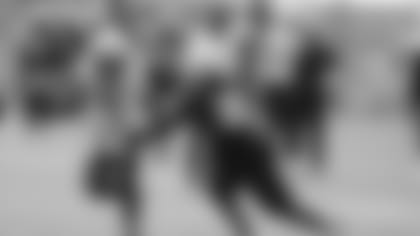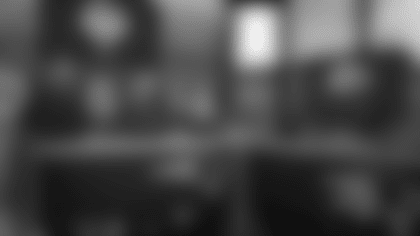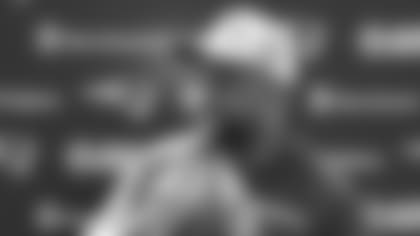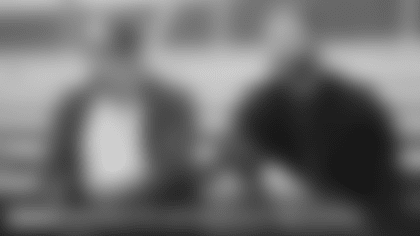[wysifield-embeddedaudio|eid="395006"|type="embeddedaudio"|view_mode="full"]
Q: What is it about Logan Ryan's skillset that allows him to be so successful when matched up against bigger receivers?
BB: First of all Logan prepares very well. He studies the receivers, he has a good understanding of our defense and he really works hard at the preparation every week so he has a pretty good jump on what to expect and he's very well prepared week-in and week-out. Logan has got good strength, he's a good tackler, he can get those backs and bigger receivers on the ground, good hands, good awareness and he can play strong on the line of scrimmage and those types of areas whether it's against bigger guys or getting his hands on smaller guys and kind of knocking them off their route. He does a good job in all those areas.
Q: Is he a big weight room guy?
BB: He works hard in the weight room, but I'd say he's got good playing strength and plays with good leverage and good pad level. He's I'd say not by any means weak, but I don't think he's going to hold the weight room records either at that position. But he's got good playing strength and good technique.
Q: Brandon Bolden seems to be very successful at getting to the outside and making yards that way. What have you seen from him?
BB: Brandon has got a real good skillset. He has been a valuable guy for us on all four downs, so whether it's carrying the ball, making tough yards, playing as a sub back and playing in the kicking game, he's shown a lot of versatility and given us a lot of quality plays in all those situations. I think his skillset is really, really good. He's got good quickness. He's got the ability to break tackles in space with his playing strength but he also has quickness to make guys miss out there, too. He's got good run vision, sees the holes and sees where there is space. The play that he made at the end of the game last week in Houston was a really good cut, good play on his part. I don't think we had the play blocked for the kind of yards he made on that play. He got six or seven yards with his vision and getting the ball into space on the cut back and probably made another four or five yards just with his running strength and balance to knock over a couple tacklers and pick up the first down. Probably a little over half that yardage came on his vision, his run instinct and then a few extra yards came on his physical running style and balance. I think that run is a good indication of all those things being a part of his playing style and effectiveness.
Q: Is that vision something he's always had going back to Ole Miss?
BB: Oh yeah, he was a good runner in college, and he's done that for us I'd say throughout his career here.
Q: What have you seen from Marcus Mariota? Who does he remind you of? Looking at your roster, is Jamie Collins the best athlete on the team, and if so, why?
BB: Jamie is very athletic. I think one of the things you've got to take into consideration when you look at a football team is size. You could have a real athletic 160-pound guy, but size is going to be a factor on that, and then you can have another guy who is 320 pounds and relative to most other players on the team maybe you wouldn't consider him real athletic but relative to other players comparable to his size and weight, he would be in the upper echelon of that. I think there are a lot of different categories. It's really hard to compare the athleticism of a receiver with the athleticism of an offensive lineman and so forth. But I think when you take all that into consideration, given Jamie's size in addition to his athleticism, he's in a pretty special category there. Do we have guys on the team that run faster and could do different drills faster than him? Yeah, probably we do. I know we do, but not go in and have the same kind of strength and power and explosiveness he has. That's kind of the difference. But it's a hard thing to measure. You start talking about receivers, you've got a 225-pound receiver and you've got a 170-pound receiver. They're both receivers, but there is a 50-pound difference there so to compare one guy to another, one guy is going to be good at one thing – assuming they're both good players – I'm saying one guy is going to be good at one thing and another guy is going to be good at another thing. And you can do that at various other positions so even within the same position sometimes, it's hard to compare players when they're that different physically. Mariota has been definitely an interesting guy to watch. I'd say he's improved over the course from preseason all the way through to the regular season, obviously very athletic, is completing a good percentage of his passes, has had good production, 2-1 touchdown-to-interception ratio. So like anything else, he's a young player that is learning and getting better, but he's smart, he's athletic in the pocket, he brings another dimension to the game. The run he had against Jacksonville, you'd have to look a few years to find a play comparable to that. Terrell Pryor went 93 yards in Oakland against somebody, ran through half the team, but kind of the same play that Marcus had last week. For a player to do that at that position is pretty special, but I would say overall in the passing game, he's developed and continues to improve and has the ability to throw the ball inside, outside, down the field and take advantage of the matchups. He's a smart player, has some responsibility at the line of scrimmage, so I don't think that's too much for him. He does a pretty good job of getting the team into the right play or out of a bad play, things like that.
Q: Every team has unsung players that contribute even though their jerseys aren't sold in the Pro Shop. With that in mind, could you touch on Brandon King and the role he has played thus far?
BB: I don't know how unsung anybody is really. Everybody's job is important. I have an appreciation for what everybody does and I try to I would say the best that I can make that known and apparent that whether it's a practice squad player helping his teammates prepare who going to play or we have injured reserve players that help us with projects or little things that they can do because they're not able to play or practice but they still can contribute in other ways. Guys that have different playing times, their playing time breaks down differently, but that doesn't make them any less valuable of a player because you never know when those players are going to have to play. A lot of it is opportunity, when a player gets a chance to do it, but he has to be prepared every week. Sort of like a relief pitcher going into a ball game, you don't know if you're going to pitch today or not but you've got to be ready, too. Even if a player doesn't get an opportunity to play, the fact that he's working hard to prepare to play, from my observation doing everything he can do in his preparation during the week, then I think that's a big measure of it until he actually gets in there and has an opportunity to perform. I don't take any of those things for granted. I think they're all important and that's what makes a team. The unsung player is just probably 40 or 50 of them you could put in that category legitimately from game to game or from the different situations that come up or things they do that don't get noticed on Sunday but they're still an important part of the team and the team's preparation. You can go to the assistant coaches and a lot of the other support people, too, for that matter – guys that again do a lot of work behind the scenes that aren't on the field on Sunday but they help prepare or care for or train or whatever their job or role is on the team that they help those players at that time in those situations, and again that's very valuable.
Q: You guys have been using a lot of motion right before the ball is snapped. What is the advantage of doing that?
BB: Usually when you put a player in motion it's to either gain an advantage somehow on the defense or it's to force the defense to communicate and adjust after they've already made their call and you've come out of the huddle and lined up. I'd say it would fall into one of those two categories. Sometimes you do it just to force the defense to deal with something, change of strength or a tight split or a wide split that goes from one to the other, where the tight end aligns, which we know is important when teams are setting their front, their linebacker locations and trying get ready to set up their gap control. If you're trying to gain an advantage, that's one thing. If you're trying to in general force the defense to communicate and be ready to play one thing when you're actually going to snap the ball and do something else, then there's some subtle advantage to that that's hard to measure, but you know from experience that it's taking place and it puts more stress on your opponent.
Q: Tom Brady was asked about Malcolm Butler this morning and he said the one trait that stands out to him is Malcolm's quickness. What stands out to you?
BB: I would agree with that. I think that's definitely a part of it. Malcolm does other things well. He tackles well for his position. He's got good ball skills. I think there are a number of things that … He has good playing speed. Like I said, I think there are a number of things that he does well. Quickness is one of them – that's part of it – but I think it's hard to be a good player in this league if you can only do one thing well, no matter what that is. You have to have more than that and something else besides just one thing. Size, strength, quickness, instincts, ball skills – those are all important. The more the better, but I think it's hard to have one thing.
Q: What changes if any have you noticed since Mike Mularkey took over as head coach?
BB: I probably can't give you a real good answer to that question. We've been focused … At this time of year when you see a team, you want to have an awareness of the overall season, but you're really more focused on the more recent games. For a team like Tennessee, especially a team that we don't know very well, what Jason McCourty's role was early in the season and how they played and what they did with him and how that affected other guys doesn't really matter to us right now because that's not going to be a factor in our game, so to go back and kind of analyze it and take a look at it and so forth I would say has not zero but minimal benefit. What we really need to do is look at the players who are playing at the cornerback position now or a player like Derrick Morgan who's been out for a few weeks whether he plays or doesn't play that's obviously significant to our preparations and I'd say our focus is really more on the last few weeks here in terms of how they're playing as opposed to trying to compare it to what happened in the first three, four weeks of the season when there were other changes – there were personnel changes, there were coaching changes, maybe there were philosophical changes. I don't know which idea belonged to who or I don't know if it really matters at this point, but definitely our focus is more just on trying to get the team, understand where the team is now and prepare for the current situation rather than get into a lot of what trended or what changed what and so forth. I know that's not really what you're looking for, but honestly what you're asking isn't something that I would say we really put a lot of focus on. We're just trying to figure out what we're going to get right now.
[wysifield-embeddedaudio|eid="395011"|type="embeddedaudio"|view_mode="full"]
JOSH MCDANIELS CONFERENCE CALL
Q: How has Brandon Bolden grown as a running back in this offense?
JM: Brandon's a talented guy. He's had a lot of different situations come up during the course of his career here whether through injury or otherwise. He's really done a nice job for us coming in and filling in and he's gone over 100 yards a couple times, he's had some big runs, he's carried the ball in cold, sloppy weather and protected it for us as he's matured and grown in our system. He's a dependable guy. We trust him to blitz pick-up. We trust him to be in the game in those critical situations when you get a lot of different looks from the defense. He studies hard. He's a guy that comes to work and prepares well. There's always been a lot of talent with Brandon and his dependability and his ability to do a lot of different things within our offense has just improved with each year that he's been here. Brandon's a good runner and he does a lot of things that are really valuable to our football team whether it be on offense or in the kicking game. We'll try to certainly do the best thing we can here going forward in terms of how we use him among the rest of our backs.
Q: Is there any kind of special skill or talent that allows guys like him to be ready when they haven't been receiving a lot of reps?
JM: I think that comes with maturity. It's hard to stay focused maybe when you're real young and you're not playing a whole lot in a specific role to understand how valuable your preparation is and how close you really are to playing. That's a challenge for everybody. There are a lot of players that back people up and I think the more they mature, the more they understand how close they are to playing [then] the easier it is to prepare and get ready to play like you're going to be in there on every snap. I think we have a lot of guys in our locker-room that are ready if their numbers called and are ready if something should happen and they're called to duty and Brandon is definitely one of them.
Q: How does the offense benefit from snapping the ball when one of your skill guys is moving in motion?
JM: I think there are a lot of uses for motion on offense. It's not always in the passing game. There's definitely some things you do to help yourself or create angle or blocking patterns with motion. The running game – you can certainly try to avoid contact at the line of scrimmage by the use of motion. You can force defensive communication if you motion from one side of the formation to another, if you motion from a wider split into a tighter split [then] there are a lot of things the defense may have to adjust to and talk about. There's maybe later motion that you try to potentially gain an advantage going – whether it's across the formation or into it, away from it – whatever it may be. Every time somebody on offense moves, somebody on defense has to react. There are times in the game where you want to try to give yourself every opportunity to gain an advantage before the balls snapped if you think motion can help you. There's a lot of different ways to try it, a lot of different things you can use. It can help many times and sometimes it doesn't do much depending on the defenses call that they have played. Hopefully it works a lot more than it doesn't relative to gaining something offensively. We certainly try to do some of that to help in many different ways.
Q: What makes Bryan Stork a better center than David Andrews?
JM: We're always trying to get the right group out there. There have been games where Bryan and David have both played in the same game also. David played this last game towards the end as well. I think they're different in terms of the type of player they are, both of them are smart and dependable and tough, do a lot of different things to try and help set the table for the rest of our lineman and get everybody going in the right direction. Bryans a little bit more experienced certainly at this point having played quite a bit last year. I think both guys have a lot of strengths to them. Both guys certainly work hard to try and improve some of the things maybe they don't do as well as they'd like to. I think they work extremely hard, bring great work ethic to our offense. There's a presence inside, a toughness that they both have. Bryan certainly like I said, he's played a lot of good football for us. I think it's a consistent competition there. I think we encourage that at all positions and those guys definitely have embraced that. They go and compete hard in practice each week going forward to try and get better individually and improve the other guy at the same time through competition and we try and put the best guys out there that we can each week.
Q: What have you seen from Dick LeBeau's defense in Tennessee that is similar to his time in Pittsburgh?
JM: There's definitely some carry over – you can see that – the personality of the defense, the style, aggressive nature that they play with. The front is definitely a strength of theirs, can be very problematic. They've got some good players. They do a lot of movement. They have two good edge rushers. I know [Derrick] Morgan's banged up but [David] Bass comes in there and does the same thing, [Brian] Orakpo's certainly a problem. I really think [Jurrell] Casey's a very, very good player inside. They've got some other guys that are stout in there with [Sammie] Hill and [Al] Woods and [DaQuan] Jones as well and then they blitz their linebackers in every combination that you can imagine. I think their inside linebackers have ten sacks between the two of them, which I would say is rare relative to most of the teams that we play. We're going to have to be on our toes on every snap because they do pressure and challenge you in many ways relative to picking up the people that are coming after the quarterback. That aggressive nature carries over into third down and actually goes up I believe in terms of percentages. [There are] a lot of different things we've got to prepare for. I'd say a lot of it, you have some familiarity with relative to times you've played against Coach LeaBeau and Ray [Horton], when we've played against Ray in Arizona and Cleveland. But I think each week it's different as you start to learn the team because these guys are really well coached and they're going to adapt their scheme and what they're doing to the players that they have, and that may be a little different than the teams that they've coached before. No different than what we do on offense here. [We've] got a lot of new players to learn and get familiar with and help our guys study and be ready for and a very difficult scheme to prepare for as well. We're going to need a lot of good communication and good execution in order to move the ball consistently on Sunday afternoon.
Q: Was Shaq Mason's performance Sunday against Houston his best of the season thus far?
JM: I thought Shaq played one of his better games of the year, for sure. I think he's continued to try to work hard at the things that maybe he wasn't experienced in relative to coming out of the Georgia tech program. I think we're past that now. Shaq's played a lot of football for us this year. He's seen a lot of different things and I think a lot of those things are coming back to help him now that he's got some experience and some exposure to different schemes and different ways people play. Shaq works extremely hard with the rest of our young group there that's really studying hard each week, trying to improve some of the areas of their games, whether it be in the running game or pass protection. I thought our communication last week and in particular with he and Sebastian [Vollmer], it was pretty good. Those guys are a good front, they're going to make some plays on you but I thought Shaq handled himself well and like I said, between he and David [Andrews] and Tre [Jackson] and that group of rookies, they just come in each week and work hard. They know they've got some things that they can improve on and hopefully we can continue to get better as we go through the season. That was an encouraging sign from Shaq to see him play the whole game and help us run the ball effectively at times and held off a decent rush with different patterns of blitzes and those kind of things. I thought he stepped up for us.
Q: How much better does the team become after you are able to get guys like Keshawn Martin some experience and figure out what they can bring to the offense with their skill sets?
JM: That's a good question. I think every day that you go out there and work with each other – we try to encourage different combinations of guys starting back in OTA's to force multiple, multiple things. Communication, certainly I would say is the centerpiece of any good offensive team. For that matter, any team period, defense, special teams what have you so that we're on the same page. I think the ability to trust one another and understand the things that we would do when we have to react during the course of a play. Those are things that you have to learn through experience and exposure to one another. We all know going into the season that it's not going to be the same people the whole year. That's why we do that. We try to manufacture different periods in practice throughout the year so that our team knows one another as well as they possibly can because eventually they're going to have to work with each other in game situations under pressure. I think the more you know about each other, the more you know as a coach about each player, maybe what their strengths and weaknesses are, how they're going to respond in certain situations I think the better off you tend to be at the end of the season when you need to play your best football. Keshawn's a good example of a guy that we started to get some exposure to earlier in the year then he missed a few weeks and we kind of had to go back to work and do the same thing but whether its trust, anticipation, communication, just an overall confidence in one another and what the things that you can do together. I think those things are very difficult to force but you can try to manufacture a certain level of trust and confidence through repetition. I think as many times as we can in practice whether that be in competitive periods or with each other on our own side of the field just working individual drills, all of those things I would say go into assisting us in feeling good about the guys that are out there together and that's always the goal, is to try to put as many guys in the huddle on every play that trust each other, have confidence in one another and feel good about what the other guys around them are going to do. At the end of the year hopefully your trust, confidence, and anticipation is at an all-time high because you've certainly taken as many repetitions as you can. This time of the year we are still building there. There are some new faces that are still coming into the huddle and playing. Asante Cleveland played 13, 14, 15 snaps the other night. Keshawn played quite a bit. There are a lot of guys that have come in and out. I think that as much as we can continue to work on that it certainly helps us. I know the players really work hard at trying to gain the trust of one another and gather as much information about each other as they can because they certainly want to have that comfort level when they get into a pressure situation like we were on Sunday night.





